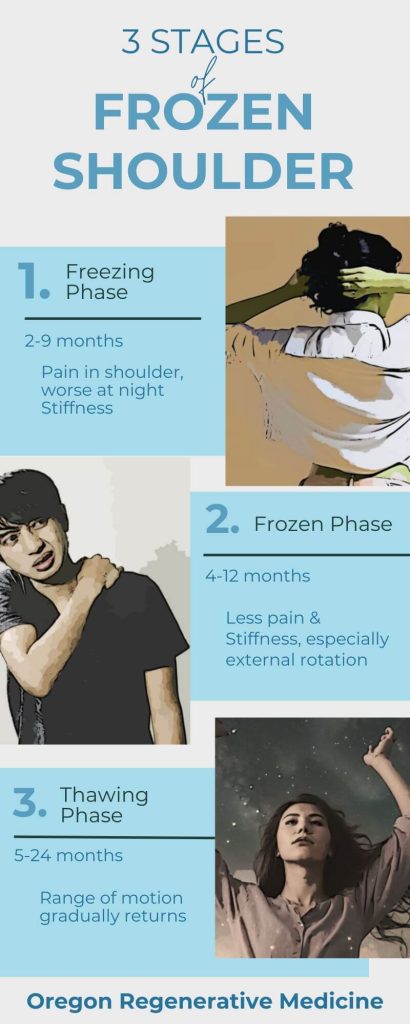Sonographically-navigated frozen shoulder release with PRP
What is Frozen Shoulder?
Frozen shoulder, also known as adhesive capsulitis, is one of the most common and painfully debilitating conditions affecting the shoulder. In adhesive capsulitis, the shoulder joint is frozen in position by shoulder adhesions within the joint capsule. Between 10 to 15 million Americans are affected by this painful shoulder condition every year1. Adhesive capsulitis can occur spontaneously or because of shoulder trauma and is a common complication following shoulder surgery. Frozen shoulder is self-limiting in almost all cases; however, the natural course of frozen shoulder typically takes 12–48 months before resolution. Patients usually lose strength and are severely restricted in their ability to perform activities of daily living, exercise or sports.
The 3 stages of adhesive capsulitis:
Typically, patients go through three stages over a period of up to 4 years: Freezing, when pain is severe at night and the shoulder gradually becomes more and more stiff; Frozen, where the range of motion is severe but pain is usually lessened; and Thawing, a gradual return of range of motion over a 5-24 month period. (from Schaffer4)
Fifteen percent of the frozen shoulder patients experience long-term disability (> 2 years) due to chronic loss of shoulder mobility.
Fifteen percent of the frozen shoulder patients experience long-term disability (> 2 years) due to chronic loss of shoulder mobility, with little benefit from conventional treatments, including physical therapy, steroid injection, surgery, and laser. Physical therapy and supervised home exercises are considered important in the non-surgical treatment of shoulder pain and frozen shoulder, although there is no hard evidence for benefit in the literature for any of the conventional treatments listed above.1
With Sonographically-navigated frozen shoulder release, most patients experience greater than 90% resolution of their pain and near complete restoration of range of motion within 10 days of the procedure.
In adhesive capsulitis, the glenohumeral (GH) shoulder capsule develops fibrosis and adhesions that restrict mobility. Under real-time ultrasound guidance, rapid and immediate release of the adhesions can be achieved. In most frozen shoulder cases, sonographically-navigated frozen shoulder release2 is an in-office procedure. The treatment utilizes an expertly guided injection of saline solution to hydrodilate and mechanically release the capsular adhesions. The procedure is minimally invasive, and patient discomfort is minimal and easily tolerated. Most patients experience near complete restoration of range of motion within 10 days of the procedure.
With hydrodilation and PRP injection, frozen shoulder can recover in weeks, not years
The second innovation we utilize in frozen shoulder is the addition of platelet-rich plasma (PRP) growth factors, which promote stem cell migration, and, as a result, improves the healing process. A recent study2 was done to determine the role of PRP injection alone in the treatment of adhesive capsulitis in terms of improvement in pain.
The results of this PRP for frozen shoulders study were remarkable. In a total of 305 cases, patients aged 49 to 71 years, 54% were male and 46% were female. In 87.5% of cases, an improvement of greater than 50% was observed at the 6-week follow-up.2
If you or someone you know develops frozen shoulders, don’t let them be in pain for several years. Instead, help them quickly recover in weeks, not years, by referring them to the non-surgical treatment experts at Oregon Regenerative Medicine.
Dr. Noel Peterson, ND, DAAPM, is the Medical Director of Oregon Regenerative Medicine, and has practiced naturopathic medicine in Lake Oswego, OR, since 1978. He specializes in natural and regenerative cellular medicine, including Prolotherapy, PRP (Platelet Rich Plasma), and Autologous Stem Cell therapy.Peterson has taught prolotherapy nationally and internationally. In 2019, the Oregon Association of Naturopathic Physicians (OANP) and National University of Natural Medicine (NUNM) selected Dr. Peterson to be honored with naturopathic medicine’s prestigious Living Legend Award.
Sources
- van de Laar S, van der Zwaal P. Management of the frozen shoulder. Orthop Res Rev. 2014;6:81-90
https://doi.org/10.2147/ORR.S71115 - Lee I, Sidiqi M, Gonzalez JA. Sonographically-navigated frozen shoulder release (S-FSR): A modified technique for sonographically-navigated, in-office hydrodilatation of adhesive capsulitis. Shoulder & Elbow. 2023;0(0). doi:10.1177/17585732231221972
- Haider SI, Awais MZ, Iqbal MT. Role of Platelet-Rich Plasma in the Treatment of Adhesive Capsulitis: A Prospective Cohort Study. Cureus. 2022;14(10):e30542. Published 2022 Oct 21. doi:10.7759/cureus.30542
- Shaffer B, Tibone JE, Kerlan RK. Frozen shoulder. A long-term follow-up. J Bone Joint Surg Am. 1992;74(5):738-746
Photos by Ron Lach on Pexels and Afif Ramdhasuma on Unsplash




